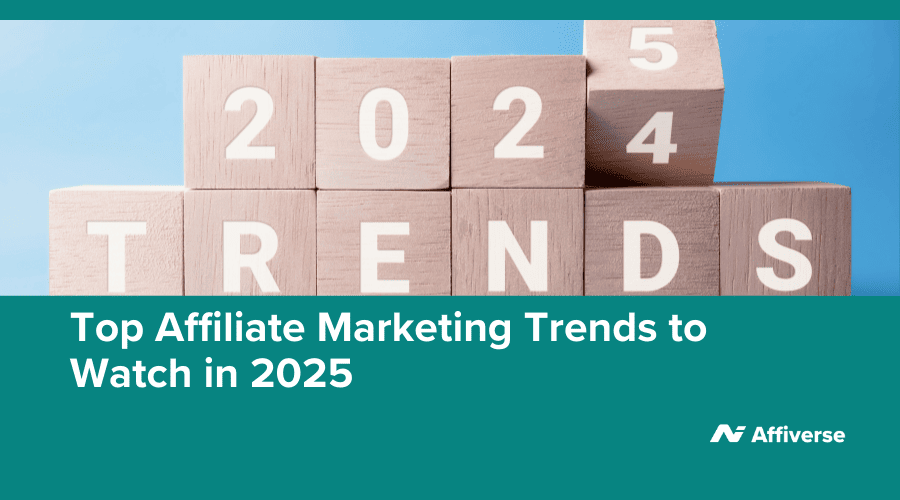Top Affiliate Marketing Trends to Watch in 2025

Affiliate marketing has long been a cornerstone of digital marketing, offering brands a cost-effective way to drive sales and reach new audiences. As we move into 2025, the affiliate marketing industry is evolving rapidly, influenced by emerging technologies, changing consumer behaviour, and new regulations.
For brands, publishers, and affiliate marketers, staying ahead of these trends is critical for success in a competitive landscape. Industry experts have identified several key developments that will shape the affiliate marketing space in 2025.
1. AI and Automation Are Redefining Affiliate Marketing
Artificial intelligence (AI) and automation are no longer optional—they’re essential tools for affiliate marketers. From identifying high-performing affiliates to automating content creation and campaign optimisation, AI is transforming how affiliate programmes are managed.
- Smarter Affiliate Recruitment: AI tools can analyse vast amounts of data to identify the best affiliate partners based on audience engagement, content relevance, and past performance.
- Dynamic Commission Models: Automation allows for real-time adjustments to commission structures based on affiliate performance, ensuring partners are rewarded fairly and motivating higher conversions.
- Content Generation: AI-powered writing tools are helping affiliates create optimised product descriptions, reviews, and blog content faster and more efficiently.
By automating repetitive tasks, affiliate marketers can focus on strategy, relationship building, and creative campaign development.
2. Influencer and Affiliate Marketing Are Merging
The line between influencer marketing and affiliate marketing continues to blur. More influencers are moving beyond flat-fee sponsorships to performance-based partnerships, where they earn commissions on the sales they generate.
Platforms like Instagram, TikTok, and YouTube are making it easier for creators to integrate affiliate links directly into their content, offering brands a more measurable way to track ROI.
- Shoppable Content: Social media platforms are introducing native shopping features that allow influencers to tag products in their posts, stories, and videos.
- Micro and Nano Influencers: Brands are increasingly partnering with smaller influencers who have niche, engaged audiences, delivering more authentic recommendations and higher conversion rates.
This trend benefits both brands and influencers, as it encourages long-term partnerships focused on mutual growth.
3. The Rise of Voice Search and Audio Commerce
As voice search becomes more popular through devices like Amazon Alexa, Google Home, and Apple’s Siri, affiliate marketers must adapt their strategies. Consumers are using voice search to discover products and make purchases, opening new opportunities for affiliate marketing.
- Voice-Optimised Content: Affiliates need to create content that aligns with conversational search queries to rank higher in voice search results.
- Audio Content Monetisation: Podcasts and audio platforms are emerging as powerful affiliate channels. Hosts can share product recommendations with affiliate links included in show notes or through spoken call-to-actions.
Brands that adjust to voice search trends will have an advantage in reaching consumers through hands-free shopping experiences.
4. First-Party Data Becomes a Priority
With the phasing out of third-party cookies and stricter data privacy regulations like GDPR and CCPA, first-party data is becoming the gold standard for affiliate marketing.
- Building Direct Customer Relationships: Brands and affiliates are focusing on collecting data directly from their audiences through email subscriptions, loyalty programmes, and gated content.
- Consent-Driven Marketing: Transparency in how data is collected and used is crucial. Affiliates must prioritise clear opt-ins and respect consumer privacy.
By leveraging first-party data, marketers can personalise campaigns more effectively while staying compliant with data protection laws.
5. Diversification of Affiliate Channels
Relying on a single affiliate channel is becoming risky. Successful affiliate marketers are expanding their reach across multiple platforms and content types.
- Video and Livestream Shopping: Livestream shopping, popular in Asia, is gaining traction globally. Platforms like TikTok, Instagram Live, and YouTube are enabling real-time product demonstrations with embedded affiliate links.
- Mobile-First Strategies: With mobile commerce booming, affiliates are focusing on mobile-optimised content, in-app promotions, and SMS marketing.
- Subscription and SaaS Affiliate Programmes: Subscription-based services and SaaS products are offering recurring commissions, creating long-term revenue opportunities for affiliates.
Diversifying channels reduces dependency on any single platform and ensures consistent revenue streams.
6. Sustainability and Ethical Marketing Take Centre Stage
Consumers are becoming more conscious of environmental and ethical issues, and they expect brands and affiliates to align with these values.
- Promoting Sustainable Brands: Affiliates are partnering with eco-friendly and socially responsible brands to meet growing consumer demand for ethical products.
- Transparency in Promotions: Clear, honest content that prioritises consumer trust over aggressive sales tactics is becoming the standard.
Ethical affiliate marketing not only strengthens brand reputation but also builds lasting trust with audiences.
7. Global Expansion of Affiliate Marketing
Affiliate marketing is no longer limited to major markets like the US and UK. Emerging markets in Asia, Latin America, and Africa are experiencing rapid e-commerce growth, opening up new opportunities for affiliates and brands.
- Localised Content Strategies: Affiliates targeting global audiences must create region-specific content that considers local languages, cultures, and consumer behaviours.
- Cross-Border Affiliate Partnerships: Brands are seeking affiliate partners with a global reach to scale their international marketing efforts.
This global expansion allows affiliates to tap into high-growth markets and diversify their income sources.
Preparing for Affiliate Marketing Success in 2025
Affiliate marketing in 2025 will be more competitive, data-driven, and technology-focused than ever before. Brands and affiliates that adapt to these emerging trends will be best positioned for growth and success.
Key strategies for staying ahead include:
- Investing in AI and automation to optimise campaigns
- Building long-term partnerships with influencers and micro-affiliates
- Prioritising first-party data and privacy-compliant marketing
- Diversifying marketing channels to reach audiences across platforms
- Aligning with consumer demand for sustainability and ethical practices
The affiliate marketing landscape is shifting, but the core principles remain the same: trust, authenticity, and value-driven partnerships. By embracing these trends, marketers can future-proof their strategies and thrive in the evolving digital marketplace.






